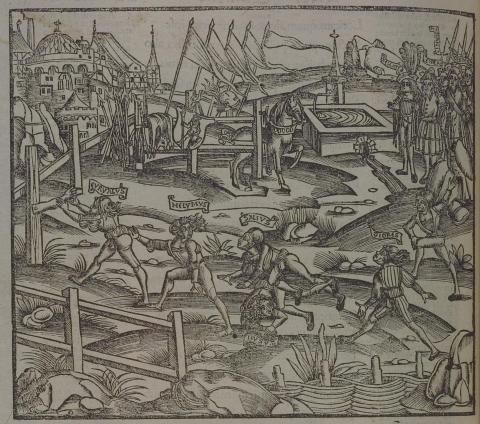CORE VOCABULARY
Aenēās, ae, m.: 1. A Trojan chief, son of Venus and Anchises, and hero of the Aeneid, 1.92. 2. Aenēās Silvius, one of the Alban kings, 6.769.
certāmen, inis, n.: a striving, a struggle; effort, 5.197; combat, emulation, strife, 3.128; battle, war, 8.639; contest, game, 5.286. (certō)
grāmineus, a, um: adj. (grāmen), of turf, grassy, 5.287, et al.
collis, is, m.: a hill, freq.
curvus, a, um: (adj.), curved, bent, bending, 2.51; winding, 2.748; crooked.
vallēs, is, f.: a valley, dell, dale, ravine, vale, 1.186, et al.
theātrum, ī, n.: a place for seeing; a theater, 1.427; any place suited for public spectacles; theatrī circus, the curving area of a theater, formed by nature, 5.288.
circus, ī, m.: a circle, circuit, circular area, 5.289; surrounding multitude or throng of spectators, 5.109.
hērōs, ōis, m.: a demigod; a hero, 6.192, et al.; an illustrious man, champion, hero, 5.453.
cōnsessus, ūs, m.: a sitting together; an assembly (others, place of assembly; others, tribunal or platform), 5.290; an assembly, 5.340. (cōnsidō)
exstruō, strūxī, strūctus, 3, a.: to build up; erect; raise, spread, 3.224; build, 4.267; p., exstrūctus, a, um, raised by, reclining on, 9.326. exstrūctum, ī, n., an elevated seat or tribunal, 5.290.
resīdō, sēdī, 3, n.: to sit or settle down; seat one's self, 1.506; settle, take up one's abode, 5.702; retreat, 9.539; sink, subside, 7.27; come to an end, 9.643; of passion, become quiet, calm, subside, 6.407.
rapidus, a, um: adj. (rapiō), that tears away; violent, fierce; swiftly moving, rapid, 1.42; speedy, quick, prompt, 5.513.
contendō, ī, tentus, 3, a.: to stretch completely; stretch, strain; strain the bow, 12.815; level the arrow, 5.513; shoot, 5.520; endeavor, strive, 1.158; contend, 4.108; hold, steer, 5.834; contend in skill of any kind.
invītō, āvī, ātus, 1, a.: to ask as a guest; to invite, 8.178; encourage, incite, 5.292.
Teucrī, ōrum, m.: the Trojans, descendants of Teucer, 1.38, et al.; adj., Teucrian, Trojan, 9.779, et al. (Teucer)
Sicānī, ōrum, m.: the Sicanians or Sicilians, 5.293, et al.
Nīsus, ī, m.: a follower of Aeneas, 5.294.
Euryalus, ī, m.: a Trojan youth among the followers of Aeneas, 5.294.
īnsīgnis, e: beautiful, 3.468; splendid, adorned, 4.134; conspicuous, 6.808; marked, renowned, distinguished, 1.10; illustrious, glorious, 10.450. (in and sīgnum)
viridis, e: adj. (vireō), verdant, green, 3.24; green wood-, 7.677; fresh, blooming, 5.295; vigorous, 6.304.
iuventa, ae, f.: youthfulness; the age of youth; youth, 1.590, et al. (iuvenis)
Priamus, ī, m.: 1. Priam, son of Laomedon, king of Troy, 1.458, et al. 2. A Trojan youth, son of Polites and grandson of King Priam, 5.564.
stirps, stirpis, f.: the lower part of the trunk together with the roots of plants and trees; the extremity, end; root; trunk, tree, 12.770; (fig.), origin, descent, lineage, stock, race, 1.626, et al.
Diōrēs, is, m.: a son of Priam and companion of Aeneas, 5.297.
Salius, iī, m.: Salius, an Acarnanian, 5.298, et al.
Patrōn, ōnis, m.: Patron, a follower of Aeneas, 5.298.
Acarnān, ānis: (adj.), of Acarnania, a country between Epirus and Aetolia; Acarnanian, 5.298.
Arcadius, a, um: adj. (Arcadia), of Arcadia.
Tegeaeus, a, um: adj. (Tegea), of Tegea, a town in Arcadia; Tegean, Arcadian, 5.299.
Trīnacrius, a, um: adj. (Trīnacria), Sicilian, 3.384.
Helymus, ī, m.: a Sicilian Trojan, and friend of King Acestes, 5.73, et al.
Panopēs, is, m.: Panopes, a Sicilian youth, companion of Achates, 5.300.
adsuēscō, suēvī, suētus, 3, a. and n.: to accustom to, make familiar, habituate to; with dat., acc. and dat., and infin., to get or become accustomed, be wont, learn; with abl., 7.746; adsuēscere bella animīs, instead of adsuēscere animōs bellīs, to cherish war in the heart, 6.832.
senex, senis: (adj.), old, aged, hoary, 7.180; (comp.) senior, ōris, older; very aged, 5.179; hoary, 5.704.
Acestēs, ae, m.: Acestes or Segestus, the son of Crimisus, a Sicilian river god, and Egesta or Segesta, a Trojan woman, 1.195.
multī, ōrum, m.: subst., many men, many, 2.124, et al.
obscūrus, a, um: (adj.), dim, dark, dusky, obscure, 1.411; uncertain; of persons, unseen, 2.135; in the darkness, 6.268; pl., obscūra, ōrum, dim places; obscurity, uncertainty, 6.100.
recondō, didī, ditus, 3, a.: to place again; put back, up, or away; hide, conceal, 1.681; bury, 10.387; bury in oblivion, 5.302.
abeō, īvī, or iī, itus, īre, irreg. n.: to go away, depart, 2.675; go off, go aside, turn off, 5.162; pass into, sink into, 9.700; go forward, take the lead, 5.318; retreat, 2.382; change or be transformed.
Cnōsius, a, um: adj. (Cnōsus or Gnōsus), of Knossos, a city in Crete; Knossian, Cretan, 3.115.
bīnī, ae, a: (adj. num. distrib.), two by two; two to each, 5.61; (poet. as cardinal), two, 1.313, et al. (bis)
lēvō, āvī, ātus, 1, a.: to make smooth, polish, 5.306. (1. lēvis)
lūcidus, a, um: adj. (lūceō), bright, shining, gleaming, glittering, 5.306; clear, 3.585.
spīculum, ī, n.: a sharp point; (meton.), an arrow, a dart, javelin, spear, 5.307.
caelō, āvī, ātus, 1, a.: to cut in relief; carve, engrave, chase, emboss, 1.640. (caelum, a chisel)
bipennis, e: adj. (bis and penna), two-winged; two-edged, 11.135; subst., f., a two-edged ax, 2.627; a battle-ax, 2.479.
flāvus, a, um: (adj.), yellowish; yellow, 7.31; gold-tinted, golden, 1.592; 4.559; yellow-haired, golden-haired; pale green, 5.309.
nectō, nexuī, or nexī, nexus, 3, a.: to tie, bind, fasten, 4.239; bind together or round, 1.448; join, unite, of soul and body, 4.695; (fig.), of arguments, 9.219.
olīva, ae, f.: an olive tree, 6.230; olive branch, olive wreath, 5.309.
phalerae, ārum, f.: bosses of metal worn on the corselet; trappings, 9.458; trappings or caparisons for the heads, necks, and breasts of horses, 5.310.
Amāzonius, a, um: adj. (Amāzōn), Amazonian (such as the Amazons used), 5.311.
pharetra, ae, f.: a quiver, 1.323, et al.
sagitta, ae, f.: an arrow, 1.187, et al.
Thrēicius, a, um: (adj.), Thracian, 3.51, et al.; Thracian in character, northern, 11.659.

